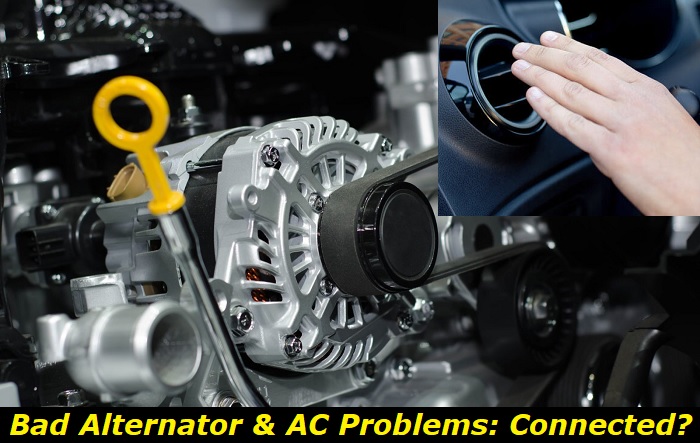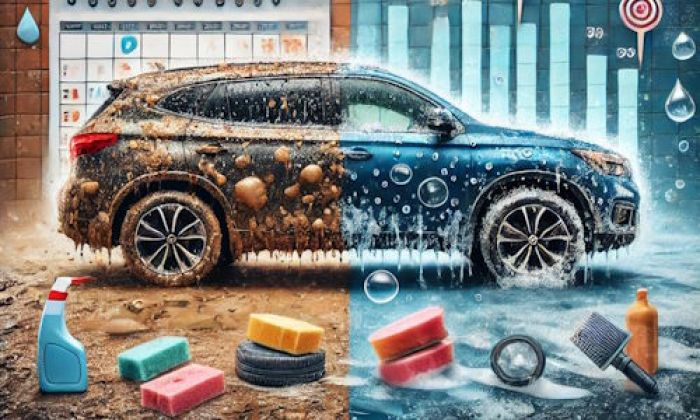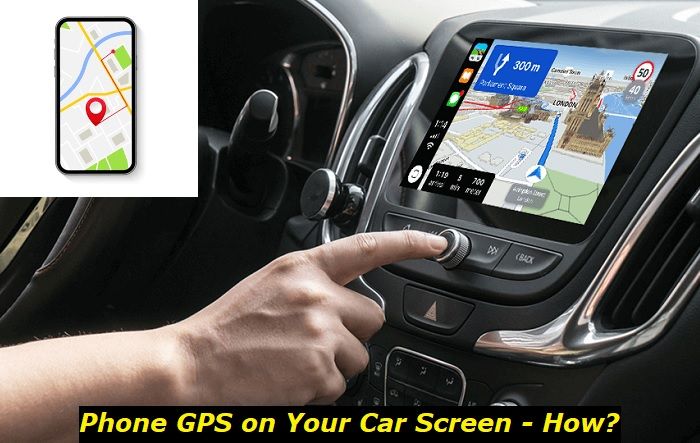The electrical system of a car relies on a battery and alternator. These two suppliers of electricity will hold all the systems in working condition and will ensure that your vehicle can go. Of course, we are talking purely about internal combustion engines. Hybrid and electric cars work differently and rely on absolutely different sources.
Alternator electrical problems highlights
- Level of urgency:high
- DIY inspection:possible but complicated
- DIY repairs:impossible
- Can you drive?yes
- Price of repairs:$150 - $800
- If ignored:power drains, brain glitching, car losing all power
- Ways to fix:check the voltage regulator, check the alternator, replace the broken unit

How does an alternator power your AC and other units?
First of all, you should know that the alternator is the only reliable source of electric energy for your vehicle once you turned on the engine.
The system works as follows: you turn on the ignition; the battery takes on all the tasks to power all electrical units in your vehicle including the AC if it's turned on; you start the engine; the alternator comes into action; the battery turns off and is charged from the alternator.
From the moment you started the engine, your battery shouldn't power any electrical units. It should only take some charge to compensate for the losses it had when starting the engine and rotating the starter motor.
So, if your alternator doesn't function properly, nothing in your vehicle will work. The car can still run using a battery charge. But once the battery is discharged, the vehicle will just stall. Of course, the AC will not work either, in this case.
Also, the majority of vehicles are equipped with special sensors that detect your alternator problems. Once it fails to power all the systems and units, you will see the battery pictogram on your dash and probably see the error message on the screen.
How does the alternator power your AC?
The alternator powers the AC just as it powers any other electrical module in your vehicle. Once the engine is turned on, the alternator starts working and producing energy. The regulators ensure that this energy is sent to the onboard electrical system with a certain amount and power.
The AC gets this energy and can pump the freon through all the radiators and other parts of the system. The conditioner compressor only relies on electricity and it can't work if the alternator doesn't send any electricity to the system.
So, now you know that when the alternator doesn't work properly, your AC won't work. It will not get enough power to make the compressor move the coolant through all those tubes and radiators.
How can you make sure the alternator is in charge of the failing AC?
Now, we turn to hard questions. Unfortunately, it's hard to check everything by yourself. In modern vehicles, it's sometimes really hard to find the reason for a certain problem. All systems are interconnected and they may fail because of some unpredictable reasons.
Here are some signs the alternator is in charge of the AC problems:
- other electrical units don't work or show errors on your dashboard;
- you see the red pictogram showing the battery on your dash;
- the battery is draining, and after a short drive you just can't start the engine;
- the vehicle goes to limp mode, nothing works as it should;
- different errors come on the dash, some messages appear that are not even connected;
- you can see that the belt in your alternator is broken or absent.
AC may not work because of two reasons: it may be off due to the limp mode restriction, or it just can lack the energy to rotate the compressor. Both ways are possible because of the alternator. But if the limp mode is on, the vehicle may have different problems, it may not be exactly about the alternator.
In any case, you will need some diagnosis before you can say what's wrong with the vehicle. The newer your car is, the harder it is to diagnose it and understand what's going on. Modern electronics create more problems for the vehicle once it fails.
What else can cause your AC to fail?
But you shouldn't think that the alternator is the only thing that can make your AC go off. More things may affect its work.
Most likely, you deal with one of these problems:
- the AC compressor is dead, the system just can't cool the air in your car;
- the fan is broken and doesn't supply your car interior with cold air;
- the climate control system fails to control all the sensors and operate the data;
- the limp mode turned off all the unnecessary equipment for safety reasons;
- there is no freon in the system, the AC doesn't provide you with any cold air;
- the alternator can't provide the electrical system with the needed power.
As you see, we put the alternator in the last place because it's certainly not the first reason why your AC fails to cool the air in the vehicle. It can only be suspected when other symptoms tell you that the alternator is not working properly.
Why can the alternator fail and how to check it?
Many reasons can cause the death of your alternator. It can fail because of a bad battery, worn-out bearings inside the unit, a broken belt, bad fixation bolts, belt tensioner problems, broken power regulators, and dozens of other reasons.
We can think of many problems that can kill the alternator or at least temporarily stop it from delivering power to the system in your vehicle. If it stops working, all the power is drained from the battery which doesn't get charged at all. This will lead to the complete death of your car in 2-3 hours of driving (depending on the condition of the 12V battery).
Here's how you can check your alternator:
- get into your vehicle, engage the hand brake;
- start the engine in your car and open the hood;
- go out of the car and locate the 12V battery in your car;
- use any appropriate instrument to unscrew the cable on the negative terminal on your battery;
- carefully take the cable off the negative terminal;
- if your vehicle hasn't changed anything and keeps working, the alternator is OK;
- if the engine stalls, the alternator is likely dead;
- if the engine started shaking and changing the idle RPM, the alternator is likely alive but not working properly.
Also, you can use the multimeter to see if the alternator gives the needed energy supply for your car. The healthy alternator supplies the vehicle with 13.8 to 14.8 Volts. If it's more or less than that, the regulator should be checked. Or the alternator is dying and should be repaired or replaced.
There are more professional and correct ways to check the alternator. But these two ways you can use by yourself without going to the shop and paying money for diagnosis.
What can you do if the alternator is failing?
If the alternator has only started failing, you still have some time to go to the nearest repair shop and have this thing fixed. Your battery is still working and supplying the electrical system of the vehicle with some energy. But in some hours the battery will die.
Also, you may check whether the belt is OK. Maybe, the alternator belt is broken and the unit itself doesn't require any repair or replacement.
But in most cases, you will still have to go to specialists and ask them to diagnose your car and solve the problem. Unfortunately, any DIY repairs will not be possible unless you are an experienced car mechanic.
If your alternator keeps failing, the AC doesn't work, and all other systems of your car send errors on your dash, it's the best time to drive directly to the service station. Because in a couple of minutes or hours, the car will stall and you will have to call a tow truck which will take even more money out of your pocket.
Final words
So, we've made it clear that the alternator in your vehicle may be the reason why your AC doesn't work. But you should check all other symptoms and only then decide what's going on with the car. Sometimes, it's not about the alternator.
If you are sure that the alternator is broken, you should immediately go to the nearest dealer or service station and have your car diagnosed and repaired. You just have a little time until the battery is completely drained and the engine stalls.
About the authors
The CarAraC research team is composed of seasoned auto mechanics and automotive industry professionals, including individuals with advanced degrees and certifications in their field. Our team members boast prestigious credentials, reflecting their extensive knowledge and skills. These qualifications include: IMI: Institute of the Motor Industry, ASE-Certified Master Automobile Technicians; Coventry University, Graduate of MA in Automotive Journalism; Politecnico di Torino, Italy, MS Automotive Engineering; Ss. Cyril and Methodius University in Skopje, Mechanical University in Skopje; TOC Automotive College; DHA Suffa University, Department of Mechanical Engineering






Add comment